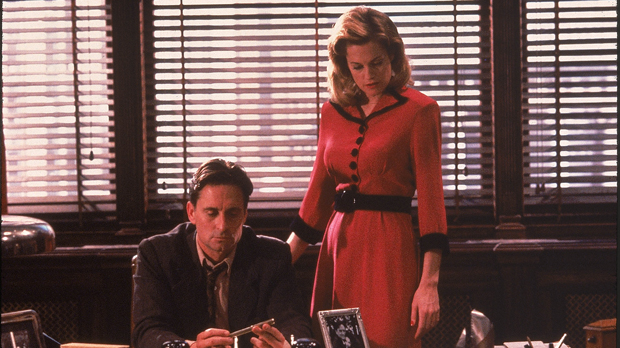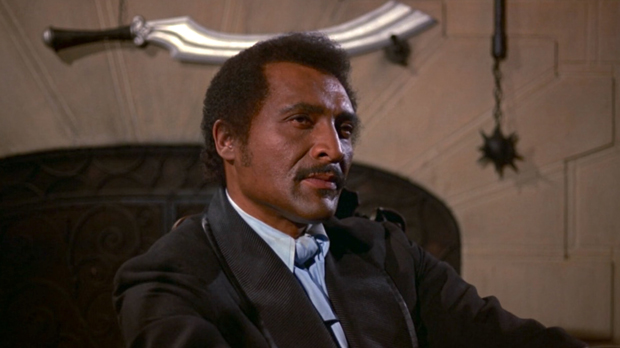 Shining Through (1992) 20th Century Fox/Drama-Thriller RT: 132 minutes Rated R (a scene of sensuality, violence) Director: David Seltzer Screenplay: David Seltzer Music: Michael Kamen Cinematography: Jan de Bont Release date: January 31, 1992 (US) Cast: Michael Douglas, Melanie Griffith, Liam Neeson, Joely Richardson, John Gielgud, Francis Guinan, Patrick Winczewski, Anthony Walters, Victoria Shalet, Sheila Allen, Stanley Beard, Sylvia Syms, Ronald Nitschke, Hansi Jochmann. Box Office: $21.7M (US)/$43.8M (World)
Shining Through (1992) 20th Century Fox/Drama-Thriller RT: 132 minutes Rated R (a scene of sensuality, violence) Director: David Seltzer Screenplay: David Seltzer Music: Michael Kamen Cinematography: Jan de Bont Release date: January 31, 1992 (US) Cast: Michael Douglas, Melanie Griffith, Liam Neeson, Joely Richardson, John Gielgud, Francis Guinan, Patrick Winczewski, Anthony Walters, Victoria Shalet, Sheila Allen, Stanley Beard, Sylvia Syms, Ronald Nitschke, Hansi Jochmann. Box Office: $21.7M (US)/$43.8M (World)
Rating: ***
Some movies are so bad and so implausible that they achieve a level of entertainment value not reached by many legitimately good movies. I haven’t watched Shining Through since it first came out more than 27 years ago. I got the urge to revisit it after reading about it in John Wlison’s book The Official Razzie Movie Guide which counts the WWII romance/spy thriller among The 100 Most Enjoyably Bad Movies Ever Made. For those of you not in the know, the Razzies (aka Golden Raspberries) are the anti-Oscars, awards given out yearly to the worst in cinema. Shining Through took home the Worst Picture dishonor as did star Melanie Griffith for Worst Actress (along with her role in Sidney Lumet’s Witness with matzoh balls cop movie A Stranger Among Us). Watching it again after all these years, I could only sit there and laugh at how completely ludicrous it really is.
Let’s start with Griffith who is totally miscast as Linda Voss, a half-Irish/half-German woman who volunteers to be an American spy during the war. When we first meet her (in present day), she’s about 80 and being interviewed for a BBC documentary about women during the war. It’s not enough that her old age makeup is as unconvincing as C. Thomas Howell’s blackface makeup in Soul Man. What’s up with her voice? It’s the same breathless, baby girl voice she normally speaks in. Voice changes with old age, everybody knows that. ANYWAY, Griffith also portrays Voss as a teenager living in Brooklyn with her German dad and Irish mom. Let’s consider that for a moment. She’s lived in Brooklyn all her life yet has no trace of a Brooklyn accent. She sounds too refined to have been brought up in a tough neighborhood. I’m sorry but were no other actresses being considered for the role? This alone destroys any chance that Shining Through might have had of being taken seriously.
Linda, who speaks fluent German, gets a job as a secretary/translator at a major law firm where she quickly deduces her humorless boss Ed Leland (Douglas, Basic Instinct) must be a spy. It doesn’t take a genius to realize that the letters he’s been dictating are actually coded messages. And how does Linda know anything about the spy business? Easy, she sees a lot of movies. She learned everything she knows about espionage at the cinema. Shortly after this not-so-shocking discovery, the two become lovers. Then the Japanese attack Pearl Harbor. War changes everything as we all know. It turns out that Ed is really an OSS officer and must go away on a secret assignment. This leads to a scene at an airfield (shades of Casablanca here) where the two lovers part ways, but not before Griffith gets off one of the movie’s funniest lines: “What’s a war for if not to hold on to what we love?” Doesn’t she see that the problems of two people don’t amount to a hill of beans in this crazy world?
After some time goes by (sorry, I couldn’t resist), Ed and Linda reunite at a USO dance hall. Initially angry that he left her, she ends up tearfully falling back into his arms as they share a dance. She goes back to work for him which is where her life as a spy begins. After an agent is murdered in Berlin, they need somebody to go into East Germany and gather information about a self-flying bomb the Nazis are working on. Linda volunteers to do it. Who better to infiltrate the home of a high-ranking Nazi officer than a servant who has access to the entire house? Although Ed initially balks, he’s persuaded by a batch of apple strudel she makes and brings to his house in the middle of the night. Pastry, works every time!
After sneaking into Berlin and learning to prepare a few specific German dishes, she assumes the role of Lina (how original), a cook sent to the home of a Nazi officer as a last-minute replacement the night of a big party. Things couldn’t go more wrong and she’s summarily dismissed. Ordinarily, the mission would be considered a failure, but being the resourceful Brooklyn gal she is, Linda/Lina finds another way to gather the needed information. She goes to work as a nanny for Dietrich (Neeson, Schindler’s List), a widowed Nazi officer with two young children. The only problem is that nobody knows where she is and she has no (easy) way of getting word to Ed. How will it all end?
There are plot holes big enough to drive a Panzer tank through in Shining Through. Let’s look at a few starting with the biggest one of all. How is it that a high-ranking OSS officer who regularly makes trips to Germany doesn’t speak or understand a single word of German? When Ed goes in to retrieve Linda (we’ll get to that in a moment), he tries to cover up his lack of linguistic ability with a bandage around his throat and a card identifying him as a wounded war vet unable to speak. That might work if he understood the language and could at least respond to what’s being said to him. A trained spy would/should know this.
Now let’s talk about how Ed finds Linda. In a highly unlikely scenario and HUGE coincidence, Ed just happens to spot Linda in a crowd while watching newsreel footage of a Nazi parade. Sure, that might happen. Next, I’d like to jump ahead a bit and talk about Linda’s escape after Dietrich finds out she’s a spy. She’s wearing a red cape over a flowing white dress, not the most inconspicuous outfit to be wearing when running through the nighttime streets of Berlin. And where does she go first? To the home of somebody the Nazis are definitely watching. Come on, really? Then there’s the scene where Ed literally carries Linda across the German-Swiss border. You mean to tell me Nazi soldiers would really stop shooting once their targets cross the line? And don’t even get me started on Linda’s big idea to rescue her Jewish cousins trapped in enemy territory. Just how does she propose to do that?
Now that I’ve given you a good idea of how boneheaded Shining Through is, let’s talk about how else writer-director David Seltzer (Lucas) botches it. A scene in a fish market that should have been tense turns into a farcical situation right out of I Love Lucy. In spy movies, there’s always a double agent. There’s one in Shining Through and this person is incredibly easy to spot. Within seconds of this character’s introduction, you’ll be thinking “Nazi spy”. Only a damn fool would trust this person. Hey, maybe that’s why they cast Griffith in the role.
That brings me to the acting. Griffith is simply awful in the lead. Douglas turns in a rare wooden performance. There is no detectable chemistry between the two leads. John Gielgud (Arthur) lends a note of class as a character whose sole function appears to be getting spies in and out of Germany. Oh, he also criticizes Linda’s German accent. Oh, does she have one?
As truly bad as Shining Through is, I couldn’t help but enjoy it. It’s a SBIG (So Bad It’s Great) movie for all the reasons listed above. However, it’s not all bad. It’s a handsomely mounted production. The sets and costumes are quite good. It feels authentic to its period. It also contains every wartime romance and spy thriller cliché known to audiences. There are a lot of scenes set in train stations where a character waits for somebody who may or may not show before the train leaves. Shining Through is filled with dopey dialogue and implausible situations. It’s not sexy, romantic or thrilling. Seltzer pretty much gets it all wrong. That’s what’s so good about it. As an aficionado of bad movies, I was in bad movie heaven while watching Shining Through. It’s the best kind of bad movie, an unintentional comedy. If you like that sort of thing, I highly recommend it.




